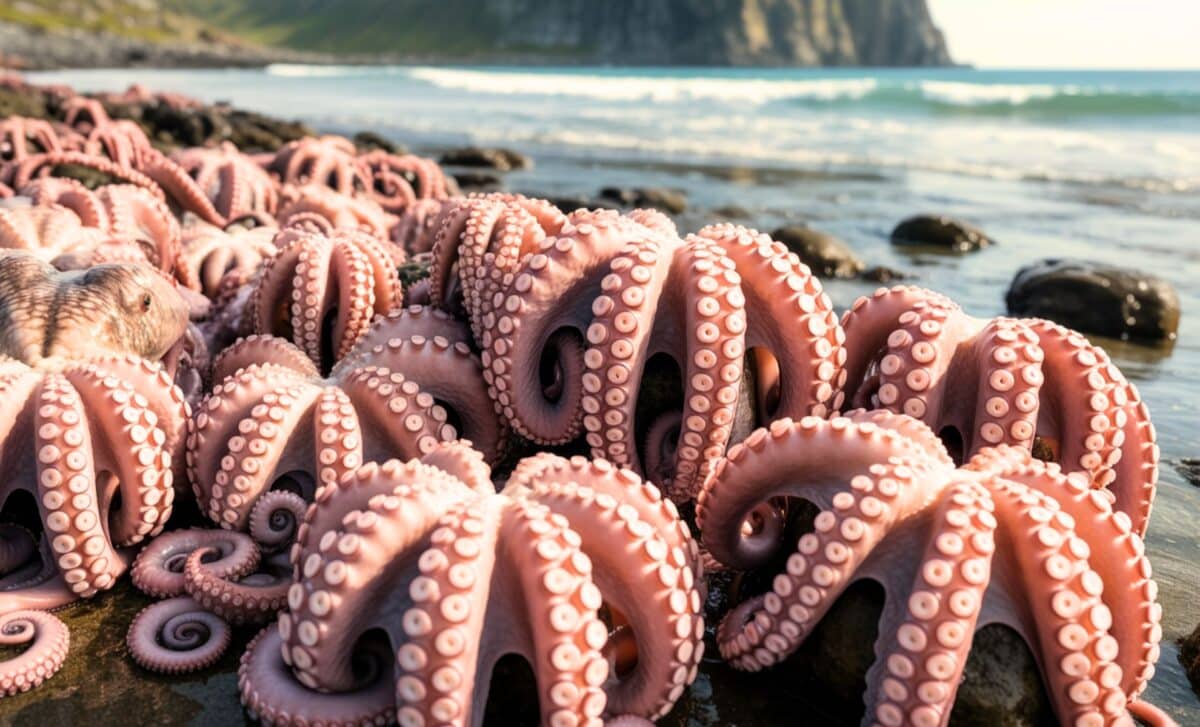In recent months, England’s southern coast has witnessed a dramatic and unexpected surge in octopus populations, transforming local fishing practices and raising alarm among scientists monitoring the ecological balance of UK waters.
Fishing ports from Sussex to Devon are reporting massive hauls of octopus. At Brixham Fish Market, one of the UK’s busiest, 36 tonnes of octopus were sold in a single day—up from just 200 kilograms at the same time last year. This spike has coincided with a marine heatwave that has warmed local waters by between 2°C and 4°C, inviting species once limited to warmer latitudes to expand north.
The phenomenon is both lucrative and disruptive. While British fishers are capitalizing on a species that currently has no catch quotas, scientists are urging caution as ecosystems face mounting pressure from unregulated extraction and shifting predator-prey dynamics.
A Heat-Driven Boom in the English Channel
The octopus surge was first reported in early spring, particularly in east Cornwall and Devon, as sea temperatures spiked above seasonal norms. Marine experts agree that these changes are consistent with broader patterns of warming driven by human-induced climate change.
“We’ve not seen them before,” said Ian Perkes, a fish merchant in Brixham Harbour for 49 years. “This time last year, they were on the French side of the water and the French were filling up with them.”
Octopuses are typically found in the waters off Morocco and Mauritania, where they sustain a major fishing industry. According to Perkes, they are now migrating north, likely due to warmer waters.
 Brixham Fish Market In Devon Is Witnessing A Rare Glut Of Octopuses Drawn Away From The Waters Of Morocco And Mauritania. Credit: William Dax/SWNS
Brixham Fish Market In Devon Is Witnessing A Rare Glut Of Octopuses Drawn Away From The Waters Of Morocco And Mauritania. Credit: William Dax/SWNS
The shift has created a temporary financial windfall for UK fishing operations, with prices reaching £8 per kilogram and exports primarily targeting Spain—a country with high consumer demand for octopus.
“It’s a financial bonus for the fishermen,” said Barry Young, managing director of Brixham Trawler Agents. “They’re grabbing it with two hands while they can.”
Young added that the species is well-suited to bottom-dwelling fishing gear, such as trawls and beamers, which previously targeted species like plaice and Dover sole. “The octopus seems to be a bottom-dwelling fish as well,” he noted.
NOAA data confirms a rising trend in marine heatwaves, with increased frequency and intensity, observed globally since the 1980s. These events are reshaping marine biodiversity and triggering species migrations.
Ecological Threat Below the Surface
The octopus influx is also causing unintended consequences. As opportunistic predators, octopuses feed on a range of species including crabs, lobsters, mollusks, and small fish—disrupting the local food web and encroaching on the livelihoods of crustacean fishers.
“Some of the boats have seen that, where the octopuses are prolific in certain areas, they have seen a dramatic drop off in crab and lobster,” Young told The Guardian. The animals are known to enter crab pots, break open shells using their beaks, and consume the contents, leaving the traps empty.
Fishers believe that escape gaps—small openings required by law to allow undersized shellfish to exit traps—are being exploited by octopuses to move in and out freely. Regulatory bodies like the Devon and Severn Inshore Fisheries and Conservation Authority (D&S IFCA) have acknowledged the issue and stated that these gaps could be closed if octopus-targeting becomes a focus.
 Roland Burlayan, a Brixham fisher, shows off one of the giant molluscs found around the south coast of England. Credit: William Dax/SWNS
Roland Burlayan, a Brixham fisher, shows off one of the giant molluscs found around the south coast of England. Credit: William Dax/SWNS
From an ecological perspective, the surge may have been facilitated by more than just warming waters. A decline in predator populations, changes in pollution levels, and altered ocean currents may have helped create conditions ideal for cephalopods to thrive.
Past Precedents, Uncertain Future
This isn’t the first time UK waters have seen a spike in octopus numbers. According to Carli Cocciardi, marine nature recovery officer at the Devon Wildlife Trust, similar increases were recorded in the 1900s, the 1950s, and briefly in 2022.
“We’re unsure why this surge is happening,” Cocciardi told The Guardian. “But the main reason seems to be warmer waters, so climate change, a sea temperature rise. It could be also changes in prey availability or ocean currents.”
She noted that the current octopuses are medium to large-sized and can reach up to 1.3 meters in length. Known for their intelligence, octopuses have three hearts, nine brains, and remarkable adaptability—traits that make them formidable competitors in marine environments with few natural constraints.
With no quotas in place and limited data on population dynamics, marine regulators face a growing challenge: how to manage a species that has suddenly emerged as both an economic opportunity and a potential environmental threat.
The Mediterraneization of the North Atlantic
The shift isn’t just biological. It’s also geographic and geopolitical. Warmer waters are driving southern species northward, a process scientists are calling the “Mediterraneization” of northern seas. In the English Channel, this has already included increases in anchovy, red mullet, and cuttlefish populations—all once considered rare.
This raises questions for European fishery agreements, already strained post-Brexit. As octopus moves into UK waters and out of traditional zones in North Africa, the economic impacts reverberate. Spanish processing facilities in Galicia and Andalusia, many of which rely on Moroccan octopus, are seeing declines in supply as catch locations shift north.
At the same time, the UK has no formal plan in place to integrate octopus into its sustainable fisheries strategy, nor are there mechanisms to monitor its long-term viability as a commercial resource.

